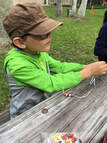|
Talking About
Florida Homeschooling... Evaluations and More |
A good evaluator works for the parents, assisting them in meeting legal requirements and in supporting them when districts overstep their bounds." |
|
Q: What if my child is behind in math? I don't want to deschool and have my child get further behind. How does deschooling work for kids who are behind already? --- A: Education is a journey. It's more like a marathon than a sprint. You have time. You have to realize that you have a few years to get this done and starting out right will help you get to the finish line with your children. One year, as a classroom teacher, I taught seventh graders who were almost all behind. About 99% of them were working below grade level. On average, my students were four years below level in math (so working at a 3rd grade level) and five years behind in reading (so working on average at a 2nd grade level). One of the first things I had to do for them in math was convince them that they could learn. That's part of what the deschooling process is about. Deschooling doesn't mean not educating. Deschooling doesn't mean that you'll stop doing math with him. It means you'll come at it from a nonschool-angle. You won't use textbooks or workbooks but will find ways to incorporate math in other ways. This can help build a better understanding of math and get him off to a better start when/if you do go back to more schoolish ways. Talk about math when doing daily activities. Cut pizzas or sandwiches into pieces and chat about the fractions made and the fractions they eat. Practice skip counting while they play hide-n-seek or some other game. Have them help figure out the better deal when looking at options in the grocery store. Help them figure out a budget for their money and give them a way to earn some more and record how much they've got and how much they'll need (including tax) for something they want to buy. Make brownies together and double the fractions in the measurements or talk about how to measure 1/4 cup or 3/4 cup without having to wash the dirty 1/4 cup measure. And so on... Bring up math when you see an opportunity to do so (or create some opportunities to do so.) Do intentional lessons on math that aren't like school. Just because you are deschooling doesn't mean you can't work on math. It means that you won't do it like a school would. You'll find non-schoolish looking ways to work on it. You won't have set timetables or worksheets to do or homework or tests, but you'll watch videos or do activities that go over math. You might talk about what's seen. Or might do some hands-on activities. But it will be casual. No pressure. And may likely help him get some more math sense that will make a huge difference when/if you return to more school-like options. For example, you might start off reading the Life of Fred math book series. They aren't traditional math books. Not at all. They tell silly stories about a little boy named Fred who is a college math professor. If your child struggles in math, start at the very beginning of the series (Life of Fred: Apples). Reading it aloud to them works best with reluctant learners and with those deschooling. Each story ends with about 4 or 5 math questions, but you can ask them aloud and have them think about the answers and tell them to you instead of writing the answers out. Or try the Beast Academy math books and start with the first one. You can just get the Guides which are graphic novels and go through those for a while. (They're meant for gifted elementary students but can work great for those who are older but struggling to understand math.) Or find other ways to approach math in a low-stress non-school-like manner. The internet is full of hands-on math lessons, math involving games or favorite toys like Lego blocks, or math using cooking, and so on. Search for some ideas that sound like a good fit for your child. Growth Mindset. But it might be even more important to take time off from math and work on developing a "growth-mindset" first. This has become a buzz phrase in recent years, but it's an important idea. A book called A Mind for Numbers may help you understand this idea. It is written by a woman who struggled with math and was sure she was bad at it. She barely graduated high school because of math. As an adult, she wanted a promotion at work but needed a college degree to get it and she knew that passing college algebra would be the big stumbling block to getting a degree. She eventually decided that she wanted that promotion and was going to start with the part that she feared most: College algebra. She decided that she was going to take the class multiple times if necesssary. She'd get a tutor. She'd keep taking the class until she passed it. All she wanted was just enough to pass. Fast forward a few years and she'd not only passed the class but went on to earn a PhD in math. In the book she shares what she learned about how the people who struggle with math approach it differently than the people who do well and once she learned to approach it not with the idea that she was bad at math, but that she needed to figure out what she didn't know and work on learning that, that she could do it but that it would take some work, then she started making big progress. That's what a growth-mindset is. Getting your child to understand that learning math can be about fixing the trouble spots and moving on from there and that missing some things doesn't mean that he can't learn math, but going back and filling in the holes in his math education can help tremendously, may help him work with you in fixing the problems--that fighting you on these math lessons doesn't help at all--can make a huge difference in how much he learns. Something like this might help: Big Life Journal blog on developing a growth mindset in math for kids When I worked with my behind math students (students that the public schools had passed on each year though they were so far behind), I started with getting them to understand that they could learn the math so they wouldn't fight me in trying to help them learn. Then I went back and worked on the basics with them. I taught them to add, subtract, multiply, and divide first with whole numbers, then decimals, then fractions, then we worked on percents, then they did those basic operations with positive and negative numbers. At the end of the year, they were still behind, but they'd moved up, on average, two years in that one school year. Homeschool parents can do even better at home with just your children because you can customize in a way that I couldn't with full classes of students. You can stop and see what your child does know and skip over those lessons and move on to the ones he doesn't know and if he's cooperating, he can make tremendous growth. Ending Deschooling If you reach a point where your child is asking for more organized math lessons, then you've reached the end of deschooling and can work on using curriculum. The deschooling process should have helped you both see that your child can learn a lot at home even if you don't follow school methods and should have helped you, the parent, see how your child learns math best--which can help you better find a math curriculum that will work for your child. You may find these quizzes helpful in choosing math materials that are a good fit when you are ready to move to an organized curriculum. Cheryl Trzasko
0 Comments
Your comment will be posted after it is approved.
Leave a Reply. |
Archives
April 2024
Categories
All
|

 RSS Feed
RSS Feed






